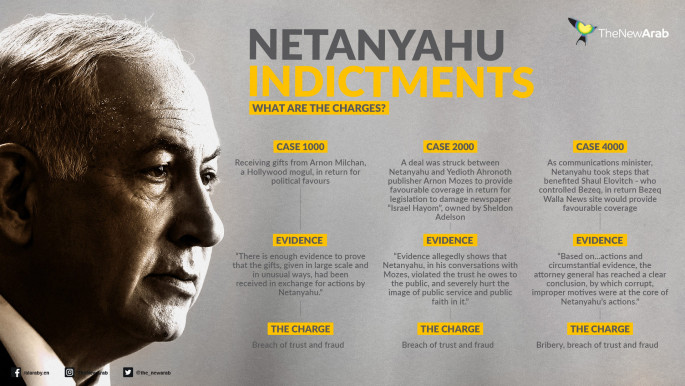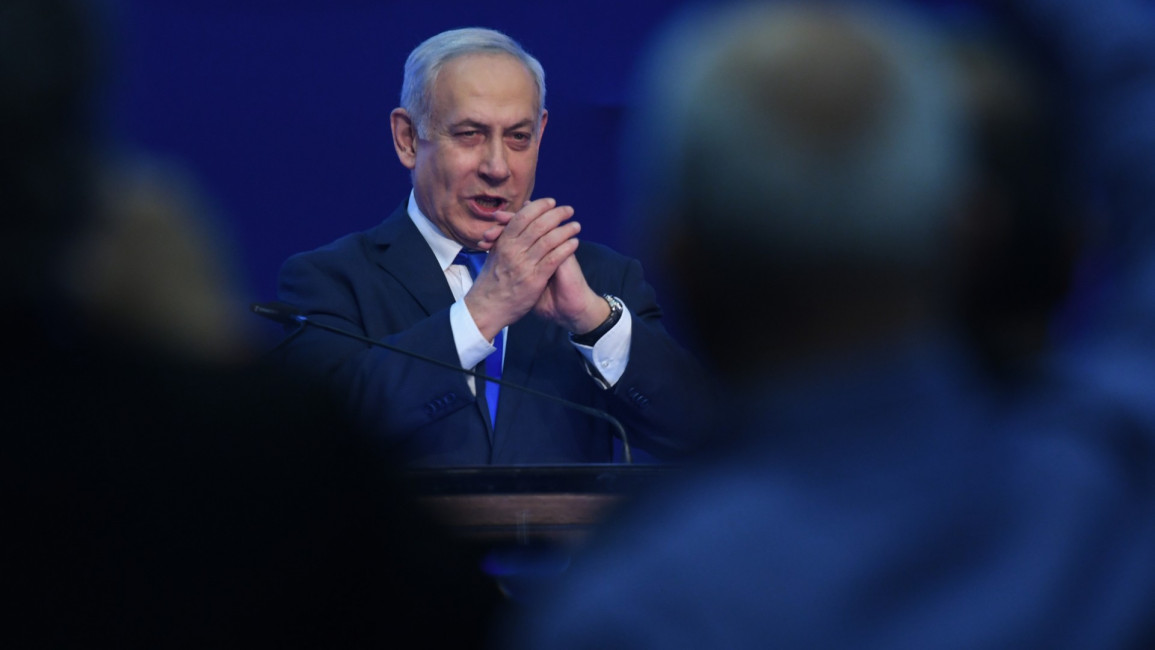Netanyahu inaugurates Israel unity government with renewed 'illegal' annexation pledge
Netanyahu inaugurates Israel unity government with renewed 'illegal' annexation pledge
The Israeli premier said it is 'time to' annex settlements in the occupied West Bank.
3 min read
Netanyahu is due to go on trial for fraud next week [Getty]
Israel's Prime Minister Benjamin Netanyahu on Sunday presented his unity government before parliament, putting an end to more than a year of political paralysis with a renewed pledge to annex large swathes of the occupied West Bank.
"It's time to apply the Israeli law and write another glorified chapter in the history of Zionism," said Netanyahu, Israel's longest-ruling premier.
The leader of the right-wing Likud party has repeatedly promised to annex Israeli settlements in the occupied Palestinian territory if elected.
That ambition has been countered by international opposition and a year and a half of political deadlock, with three consecutive elections failing to result in a majority government.
Netanyahu and leading rival Benny Gantz, a former military chief and leader of the centrist Blue and White party, agreed to form a unity government last month in order to tackle the fallout of the coronavirus crisis.
Under the agreement, Netanyahu will continue as premier for 18 months before handing over the reigns to Gantz for the next 18 months. Gantz will start out as defence minister.
With 36 ministers, the cabinet will be Israel's largest in history. Their blocs will also have a similar number of ministers and virtual veto power over the other's major decisions.
|
|
Speaking on the contentious planned annexation of parts of the West Bank, the Israeli premier claimed the move would "distance us from peace, it will bring us closer".
The vast majority of the international community considers Israeli settlements in the occupied territory to be illegal under international law, and as such stands against the proposed annexation of the settlements and other coveted areas of the West Bank, such as the fertile Jordan Valley.
The United States has pledged to support the move as part of its "Deal of the Century" peace proposal unveiled earlier this year, however. The plan backs Israel's annexation of most Israeli settlements and the Jordan Valley with few caveats, such as entering peace negotiations with the Palestinians.
The European Union's foreign policy chief Josep Borrell said on Friday that the bloc would use "all our diplomatic capacities" to try to dissuade Israel from going ahead with the move, while analysts have said annexation could prompt a break-down in the 1994 peace treaty signed between Israel and its neighbour Jordan.
According to the Netanyahu-Gantz pact, the government can begin moves to implement the Trump administration's peace plan from July 1.
'Bloated and wasteful'
The unity government has also provoked controversy at home, with the Yediot Aharonot newspaper describing it as "the most bloated and wasteful" government in the nation's history at a time of extreme economic stress due to the Covid-19 pandemic.
Particularly contentious is the creation of the new position of alternate prime minister, a post that could allow Netanyahu to remain in office even after the leadership swap and throughout his high-profile corruption trial and a potential appeals process.
The Israeli premier was indicted on charges of fraud, breach of trust and accepting bribes last year. Netanyahu denies any wrongdoing and blames the charges on a media-orchestrated plot to oust him. He is due to go on trial on May 24.
The new position is supposed to enjoy all the trappings of the prime minister, including an official residence and, key for Netanyahu, an exemption from a law that requires public officials who are not prime minister to resign if charged with a crime.
The power-sharing deal has also caused a split in Gantz' Blue and White party, with many opposing the former military chief's decision to go into government with Netanyahu despite promises he would never do so.
Agencies contributed to this report
Follow us on Facebook, Twitter and Instagram to stay connected
'Bloated and wasteful'
The unity government has also provoked controversy at home, with the Yediot Aharonot newspaper describing it as "the most bloated and wasteful" government in the nation's history at a time of extreme economic stress due to the Covid-19 pandemic.
 |
| [Click to enlarge] |
Particularly contentious is the creation of the new position of alternate prime minister, a post that could allow Netanyahu to remain in office even after the leadership swap and throughout his high-profile corruption trial and a potential appeals process.
The Israeli premier was indicted on charges of fraud, breach of trust and accepting bribes last year. Netanyahu denies any wrongdoing and blames the charges on a media-orchestrated plot to oust him. He is due to go on trial on May 24.
The new position is supposed to enjoy all the trappings of the prime minister, including an official residence and, key for Netanyahu, an exemption from a law that requires public officials who are not prime minister to resign if charged with a crime.
The power-sharing deal has also caused a split in Gantz' Blue and White party, with many opposing the former military chief's decision to go into government with Netanyahu despite promises he would never do so.
Agencies contributed to this report
Follow us on Facebook, Twitter and Instagram to stay connected


![President Pezeshkian has denounced Israel's attacks on Lebanon [Getty]](/sites/default/files/styles/image_684x385/public/2173482924.jpeg?h=a5f2f23a&itok=q3evVtko)



 Follow the Middle East's top stories in English at The New Arab on Google News
Follow the Middle East's top stories in English at The New Arab on Google News


